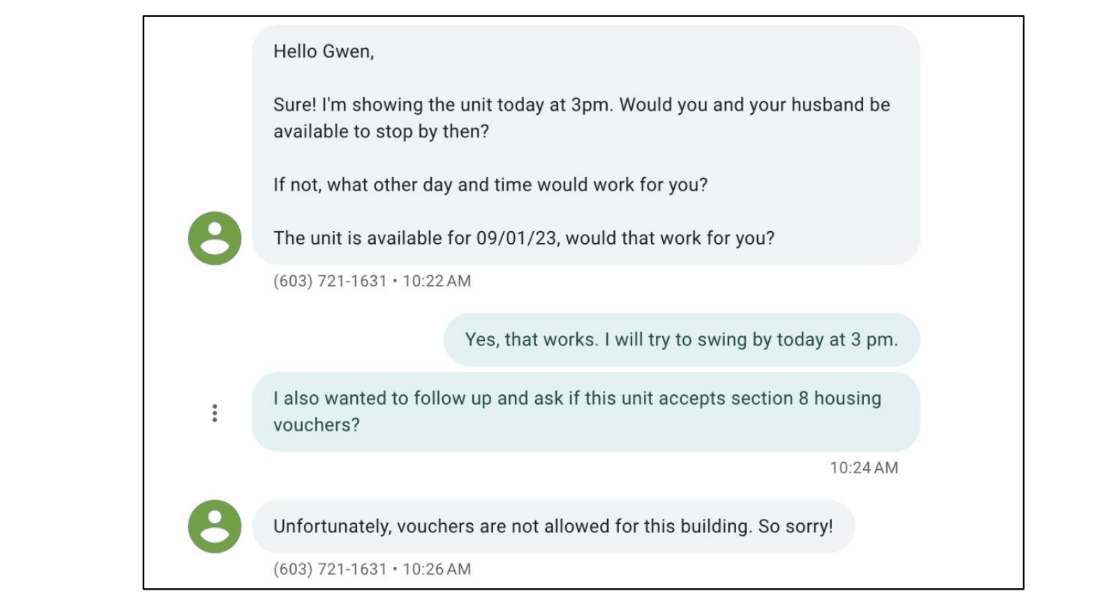Mass. Federal Judge Orders HUD to Release Held Grant Money; Mass. Fair Housing Center Back Online
. Posted in News - 0 Comments
By Kimberly Rau, MassLandlords, Inc.
In early March, clients who called Holyoke’s Fair Housing Center received an automated message that the center would no longer be accepting new cases.

This text exchange was presented in a lawsuit about fair housing violations, in which Charlesgate Realty Group was one of the defendants. Groups like the Fair Housing Center in Holyoke ensure everyone has lawful access to housing. (Image: fair use)
The website bore similar bad news.
“The Massachusetts Fair Housing Center is currently not accepting new requests for assistance at this time,” a blurb on the website read. “Any online inquiries for help submitted on or after March 5, 2025 will not be reviewed or responded to. If you are a new or current client, you will continue to receive assistance from your attorney or advocate. Thank you.”
Representatives from the Fair Housing Center told the media that the office had a $1.3 million contract with the Department of Housing and Urban Development (HUD) that abruptly terminated on Feb. 27, 2025, part of a $30 million cut by the Department of Government Efficiency (DOGE). Many groups across the country were notified by letter that their funding would be immediately stripped. The grant was in the middle of a three-year payment cycle, meaning $425,000 was revoked with no warning.
The purpose of the Fair Housing Center, and similar groups nationwide, is to enforce the Fair Housing Act by investigating complaints and litigating housing discrimination cases.
“The program really exists because the fair housing laws don’t enforce themselves,” Maureen St. Cyr, executive director of Massachusetts Fair Housing Center, told the Associated Press. “People need lawyers to make those rights a reality.”
The Fair Housing Center is just one of two organizations in Western Massachusetts tasked with education and enforcement surrounding fair housing laws. The Massachusetts Commission Against Discrimination (MCAD) also conducts anti-discrimination testing, but the wait for assistance can be years long.
The center, along with several others across the country, filed a lawsuit in the U.S. District Court of Massachusetts almost immediately following the news. A temporary restraining order issued on March 25 directed HUD to release the funds. The decision was made as a result of similar cases already decided in California, and the assertion that DOGE did not have the authority to revoke a congressionally approved grant.
As of press time at the end of April, the Fair Housing Center’s website was still up, and it was possible to fill out an intake form to potentially get a new case started.
For housing providers and their renters, this means that there are still people watching out for housing discrimination cases. Though we hope our members would not act in a discriminatory fashion regardless of who was keeping an eye on things, it’s important to understand that if you do not act in accordance with fair housing laws, you could find yourself in court, something that should be avoided at all costs. Housing discrimination cases can wind up being very expensive, and discriminating against someone based on their status as a member of a protected class isn’t how anyone should do business.
Make sure your tenant screening policies are in compliance with the law and, as always, speak with an attorney if you are concerned about changes you may have to make.




